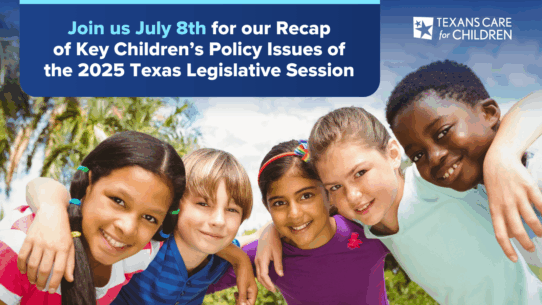
The 2021 Texas legislative session left advocates, legislators, staffers, and other Texans absolutely drained. We battled through a pandemic, a blackout, bills ranging from disturbing to distracting, and some real disappointments from the Legislature. But we also made real progress for kids. And given all we’ve been through — and all we’ve accomplished together — I couldn’t be more proud of our team, our partners, and our legislative allies.
In the following pages, we present the highlights and low points from the legislative session, as well as key next steps, in four children’s policy issues: Children’s Mental Health, Early Education (including child care), Maternal and Child Health, and Child Protection. For each of those issue areas, we also present a list of key bills — good and and not-so-good — that passed and those that didn’t pass.
I encourage you to dive into the full report or the sections that most interest you, but first let’s take a look at some of the big news from the session, starting with a few victories.
I’m particularly proud of the hard work of our team, as well as our partners, to help legislators achieve the following victories for Texas kids this session:
- Ensure moms have six months of health coverage after childbirth instead of just two months;
- Cut down on eligible kids losing their health insurance — and missing doctor’s appointments — due to inaccurate eligibility reviews;
- Stop a concerning budget cut — initially passed by the Senate — to Early Childhood Intervention (ECI) funding for toddlers with disabilities and delays;
- Limit the size of pre-k classes so more kids become strong readers by third grade, a bill that had languished at the Legislature for over a decade;
- Equip teachers to support English Learners in special education and develop a state strategic plan to support bilingualism, both recommendations of our new Texas Early Childhood English Learner Initiative;
- Improve support for students’ social-emotional learning (SEL) by incorporating key SEL skills into school curricula and programs and by opening up a funding stream for districts to provide SEL programs;
- Prevent youth suicide by improving practices in foster care facilities and ensuring data-informed suicide prevention strategies are included in state interagency coordination and strategic planning efforts;
- Support kids in foster care by moving children with high needs from group facilities to loving families as quickly as possible, improving support for older youth in foster care, and developing more foster care placements for unique populations, such as pregnant and parenting youth and trafficking survivors;
- Take big budget cuts for kids and families off the table from day one of the legislative session after last year’s warnings of major cuts.
We also played a supporting role in a number of victories for kids and families this session. One of the most exciting was the bipartisan package of child care bills. For example, legislators passed a landmark bill to improve the quality of child care that kids receive from providers in the subsidy system and a bill to create a plan to support the child care workforce. The Legislature also passed important legislation to let school counselors focus more on counseling instead of administrative duties. As lawmakers quietly passed major bills to rework the child protection system, we appreciate that legislators incorporated many of our suggestions throughout the session. We’re also pleased to see the defeat of harmful legislation, such as bills targeting transgender children and their parents.
There were also real disappointments in some of the issues we work on. The biggest blunder was state leaders’ failure to take any action to draw down federal Medicaid expansion funding to cover 1.4 million uninsured adults. There was a lot of talk about the impact of the pandemic on student mental health, yet the Legislature did little to ensure schools are prepared to respond to the effects of trauma and grief on student learning and behavior. In the midst of a disturbing shortage of foster care homes and services, we’re concerned that the Legislature failed to boost funding for foster care reimbursement rates or for the child abuse and neglect prevention services that keep kids safe and out of foster care. Similarly, while we were glad to avoid cuts to women’s health programs and ECI for toddlers with disabilities, the flat funding approved by the Legislature falls short of Texans’ needs.
Looking ahead, there’s a lot more work to do to support Texas kids and families. We encourage federal and state officials to work together to quickly implement HB 133 to extend moms’ health coverage after pregnancy. We are also urging state leaders’ to submit an 1115 Medicaid waiver funding request to the federal government that continues hospital funding to cover the bills of uninsured Texans who end up in the hospital; expands health coverage so currently uninsured Texans can get healthy and stay out of the hospital; and supports community mental health services. This summer and into the fall, we’ll be working with our partners and state agencies on the implementation of bills that passed this session. We’ll evaluate how well the scaled back version of HB 290 keeps eligible kids enrolled in their health insurance and monitor the impact of other bills. As Texas officials develop a state strategic plan to support emergent bilingual students, we’ll work to shape the plan and then support its recommendations. We will continue working to address racial disparities and promote equity through public policy and through the important discussions that must continue in the Legislature, state agencies, and our communities. And in the coming weeks and months, we’ll be working with policymakers to tackle the allocation of federal COVID relief funding.
In closing, I want to express our deep gratitude. Pursuing smart and equitable policy change is a team effort that takes months and often years of working together in partnership. We appreciate the hard work of so many state legislators who championed key bills supporting kids this session. We’re also grateful for the dedicated and exceptional staff at the Legislature. I also want to thank all of you who contributed in so many different ways this session — collaborating with us and sharing your expertise, lifting our spirits when we were down, or making a donation to keep our work going. Thank you for all your support!




